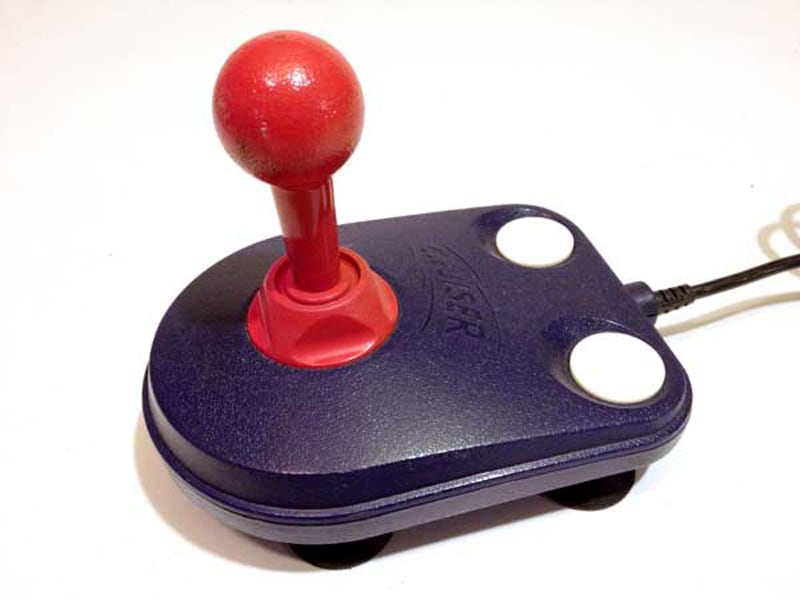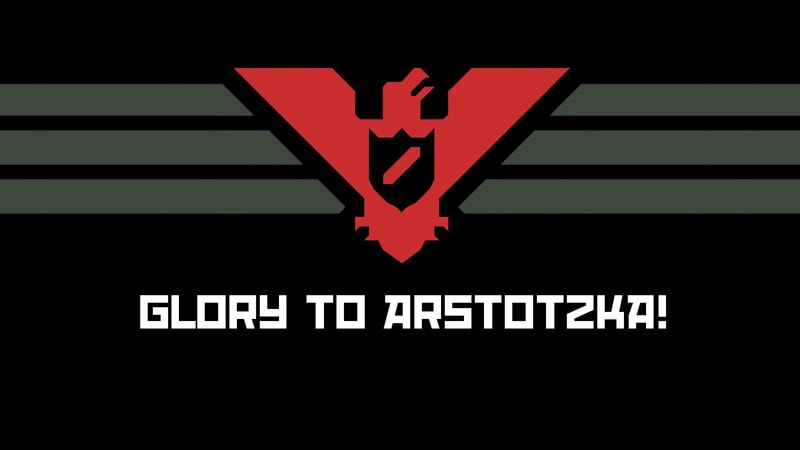Since their invention, video games have been on a trajectory of increasing complexity. Early arcade machines usually featured no more than one or two buttons plus a joystick or trackball, but modern consoles have a bewildering array of triggers, multiple sticks, touchpads, analogue buttons and motion controls, which can be daunting to newcomers. When you’re a grizzled gaming veteran like myself, it’s easy to forget that some people have little or no experience with holding a controller, until you try handing one over to a friend for a quick go on Dark Souls. In my experience they then try to walk in four directions at once, point their viewpoint at the sky and accidentally drop their sword while falling off a ledge.
When I got into games, it was all so much simpler. Pac-Man uses no buttons at all, just a single joystick, and the first game I ever played, Manic Miner, used only a joystick with a single button.

Did you have one of these? Or, to put it another way: were you as cool as me 25 years ago?
It could be said that arcade games still follow a similar pattern, since you don’t really have time to learn how to play a complex game in a busy arcade, and so they tend to offer control schemes that can be learned in just a few minutes. Drive the car by turning the wheel, press the button to jump, point the gun controller at the screen and pull the trigger: these are all fairly simplistic mechanisms, but with the decline of the arcades in favour of home gaming, it’s not uncommon to have to learn the functions of eight or more buttons just to get started with a game.

That's not really a games controller, though I sort of wish it was.
In the last few years, “casual” gaming has seen a rise in popularity, to the bewilderment of snobs like myself who think that Angry Birds is fit only for occupying your time on the toilet, but it can’t be denied that casual games can be a gateway into a whole world of more substantial experiences. Personally, I think that casual gaming is partially a response to the decline of the arcade, giving simple yet addictive games a chance to shine, but game complexity has increased in general, and players’ expectations have grown in tandem.
In this week’s blog post I’ll be looking at the games that anyone can play, but that have a little more substance to them than Temple Run or Bejewelled. This isn’t meant as an indictment of those games, but as gaming matures as a medium, I see Bejewelled as the equivalent of a five-minute Tom and Jerry cartoon, while other areas of development begin to move towards The Godfather or The Wire in their maturity. Bejewelled’s quality is still high for what the game is; it’s just not pushing human experience forward.
Today we’ll be looking at the games that are neither equivalent to Tom and Jerry or The Wire, or anything else really. Sorry, my metaphor is breaking down. Simply, these games are somewhere in the middle of the spectrum, but ideal for those who just don’t know where to start with gaming.
Wii Sports (Wii, 2006)
We may as well start with the obvious choice, and the one that you’re most likely to have played on this list: Wii Sports. In every country except Japan, Wii Sports came bundled with the Nintendo Wii (you know, the white thing that sat gathering dust next to your parents’ TV until Wii Fit came out), so there are a staggering 82 million copies out there.
Wii Sports managed to get otherwise entirely uninterested people actually playing video games, due to the way in which the controller mimicked real-life actions (to some degree, anyway). Hold it downwards and swing it like a golf club, or move your arm like you’re ten-pin bowling, or flap it around crazily like you’re an insane boxer.
Look at the trailer! Old people are playing! Families! Children! It’s so inclusive.
Withering cynicism aside, Wii Sports got controllers into the hands of almost anyone who saw it, which in some cases led to them seeking new gaming experiences with more complexity and substance. Sadly, in most cases it led to people owning a machine that only got dragged out at Christmas, and a lot of companies churning out terrible software to take advantage of so many Wiis being in the houses of people who couldn't tell a good game from Ninjabread Man.
If you like it, try: The Legend of Zelda: Skyward Sword, Heavy Rain: Move Edition
Super Monkey Ball (Arcade, 2001)
Although it debuted in the arcade, Super Monkey Ball found success as a launch title for the Gamecube (also in 2001). The premise remained as simple as it was in the arcade: you control a monkey in a ball, and you must roll to the exit before the timer runs out. The real beauty of Super Monkey Ball was the way that, like Wii Sports, it got controllers into people’s hands. The controls involve using no buttons at all, just the analogue stick, and so it takes no expertise to quickly start playing at the same standard as everyone else (which is low, because Super Monkey Ball gets hard on the later levels).
Before you know it, even as a reluctant gamer, you feel comfortable holding a Gamecube controller and suddenly you’re wondering what all these buttons could be made to do in a more complex game, and that’s where the mini-games come in. Monkey Golf, Monkey Pool and Monkey Target (among others) all use a few more complex controls, easing the casual player into comfortably using an array of buttons and triggers.
Perhaps it just came at exactly the right time in my lifespan, but in my experience Super Monkey Ball turned a lot of people from reluctant spectators into avid gamers, and late-night sessions with four people hunched around a small CRT television became common.
Also, games about monkeys are almost invariably great.
If you like it, try: Pikmin, Kirby Air Ride
SingStar (PS2, 2004)
SingStar is almost so simple as to need no explanation, but I can offer you one in a single word: karaoke.
Though it wasn’t by any means the first karaoke video game (that honour goes, I believe, to the 1987 NES game Karaoke Studio), SingStar popularised karaoke in video games and has now become a huge franchise. Simply, it requires you to sing into a microphone in time and pitch with the lyrics of the original artist, though with the added twist that the PlayStation can offer you a score based on how well you replicate Britney’s “Toxic”, or whatever awful dirge you choose to attempt, rather than having to judge your success by the reactions of your fellow drunken karaoke club-goers.
The rhythm-action genre has seen a decline in the last few years, but SingStar got a lot of people using consoles that otherwise wouldn’t have been interested. Suddenly, getting back from a night out meant the embarrassment in front of your friends was just getting started.
If you like it, try: Rock Band, Jam with the Band
The Walking Dead (Windows, Mac OSX, PS3, Xbox 360, iOS, 2012)
Telltale Games have seen an incredible rise in popularity in their nine years of game making, sticking almost exclusively to their preferred episodic format. If that confuses you, just know that they make games in chunks and release them over a period of months, rather than all in one go, somewhat like a TV show.
The Walking Dead, if you don’t know, is a comic book series (that was also adapted into a TV show) about zombies, but the focus has always been on the characters and their interactions in a post-apocalyptic world. The game sees you controlling an original character but occasionally encountering familiar faces from the comics, but rather than having to act quickly to escape zombies, much of the time in the game is spent talking to people and making moral choices about how to proceed. Some of these choices have long-reaching consequences, and may even result in one character dying while another lives, so the majority of the difficulty of the game comes from learning to live with what you’ve done.
I know that that sounds like hyperbole, and to an extent it is, but there were moments during the game that I felt guilty for the choices I made and the impact of my actions.
The draw for non-gamers, aside from the compelling plot and excellent comic book aesthetic, is that the game is very forgiving in its demands of you as a player. The controls are relatively simple (whether you play with a mouse or a controller), and most of the time you’re not required to act quickly, just thoughtfully, making it great for those who aren’t necessarily comfortable with a fast-paced game.
If you like it, try: The Secret of Monkey Island, Broken Sword: The Shadow of the Templars
The Sims (Windows, Mac OSX, 2000)
You’ve heard of The Sims, right? It’s the most successful PC game of all time, and the fifth-highest selling franchise of all time, losing out only to things like Mario and Pokémon but still beating Grand Theft Auto. I'm sure you must have heard of it.
For the newcomers among us, The Sims has been described as a “dollhouse simulator”, giving you the chance to construct a house and shape the looks and personalities of the inhabitants, essentially giving you the freedom to do as you wish with them (albeit within a sanitised facsimile of the real world). Send them out to work and earn money, make them squabble, party or procreate, and watch them get old as their children grow up. It’s very realistic in some ways (though when you can sell your windows to buy food, it kind of loses that realism).
The Sims has a low barrier to entry, so within a few moments of starting the game up, pretty much anyone can build a box house, put a couple of people in it, and watch them wet themselves when you forget to buy them a toilet. The freedom inherent in the game means it has a wide appeal (hence the astronomical global sales totals) and while much of that audience consists of teenage girls, there’s scope enough for even a jaded cynic like myself to garner some enjoyment from it. It’s always fun to make a Sim jump into a swimming pool and then remove the ladder, meaning he swims himself to death.
Who says video games are warping our minds?
If you like it, try: SimCity 4, Animal Crossing
Professor Layton and the Curious Village (Nintendo DS, 2007)
The Nintendo DS sold even more widely than the Nintendo Wii, and with over 150 million of them out there, some fairly experimental games were developed to make use of the unusual touch controls and dual screens. The Professor Layton games were among them, and combine a whimsical animated style, strange yet interesting story, and devious puzzles.
The game featured a variety of puzzles, from sliding blocks to finding the correct number to balancing scales, none of which were especially innovative but all of which were aimed at just the right level to make you feel clever when you find the solution. Because of the short nature of each puzzle, it’s a perfect game for quick goes (say, when you have to sit somewhere for a few minutes, perhaps somewhere made of porcelain), yet it drives you on to find the next puzzle. A game that makes you feel smart is unsurprisingly addictive.
Because Professor Layton is entirely controlled with the stylus, never asks you to do things at high-speed, and is easy to understand, it’s perfect for those who haven’t played many games before. The charming animated sequences are just there to pad out the space between puzzles, but make the entire experience a lot more coherent and give you a reason to keep going through the game, and then once you’re done you’ve got at least five sequels to approach…
A recent spin-off saw Professor Layton paired with Phoenix Wright (from the Ace Attorney games) for a puzzle-solving court case drama bonanza. Phoenix Wright: Ace Attorney is a little more complicated than Professor Layton, requiring more deduction and lateral thinking, but it’s hard for anyone to resist a game that requires you to yell “objection!” at your DS, especially in public.

If you liked it, try: Phoenix Wright: Ace Attorney, Rhythm Thief and the Emperor’s Treasure
Papers, Please (Windows, Mac OSX, 2013)
Described as “a dystopian document thriller”, Papers, Please sees you taking on the role of an immigration inspector on the border between two fictional Eastern European countries in 1982. Using only the mouse, you have to check through the documents of potential immigrants to Arstotzka, making sure they’re not trying to get in with forged papers, all while making sure you process enough immigrants per day to get paid enough to buy food and fuel for your family.
It’s as bleak as it sounds.
Papers, Please is a game that evokes the cheerlessness of life in the Soviet Union, and can make you feel contempt for average people making your job harder, despite yourself. It’s not a happy game, but it’s one that I feel highlights how games can have a message that can’t be expressed through any other medium. A film or a TV show about border control could be emotional, but putting you in the role and making you experience the frustrations, difficulties and gloom for yourself makes it that much more affecting.
I’m still not going to get into the debate of “are games art?” here, though.

If you liked it, try: To the Moon, Cart Life
If you’re already an experienced gamer, perhaps you’ve found this article a little patronising, but it’s worth remembering that we were all non-gamers once (though for some of us, that situation was resolved merely by being born). Modern gaming can be a complex and sometimes unwelcoming pastime, but next time you find yourself hoping to convert a friend, spouse or family member to our ranks, try them out on one of the games listed above and gradually work them up to Mass Effect or The Last of Us (more on those in future blog posts, I’m sure).
What games have you used to get people into gaming? Do you think I’ve missed anything obvious off this list? What games got you started, and how bad are you at Dark Souls? Get in touch with me through the comments below, via Facebook, Twitter, Google +, or email [email protected] and let me know!
Written By: Dave Morgan
Glory to Arstotzka!